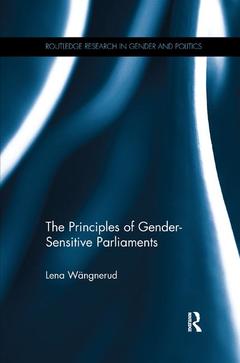The Principles of Gender-Sensitive Parliaments Routledge Research in Gender and Politics Series
Auteur : Wängnerud Lena

Gender serves as a lens that makes visible important issues in the field of representation: Whom do elected politicians represent? What is at stake in the parliamentary process? What do we know about the interplay between parliaments and the everyday lives of citizens? It is widely understood that women?s presence in government matters but we need to understand the conditions under which it matters more clearly.
Using Sweden as a case study, a country where the number of women elected to the national parliament has steadily risen since the 1970s, Lena Wängnerud presents a novel approach on which characteristics inside a parliament help translate physical representation into substantive representation for women. Using three guiding principles: (i) the implementation of equal opportunities for women and men to influence internal parliamentary working procedures; (ii) the creation of room for women?s interests and concerns on the political agenda; and (iii) the production of gender-sensitive legislation, Wängnerud shows what are the necessary conditions for women?s needs, interests, and concerns to be adequately integrated into parliamentary processes.
The Principles of Gender-Sensitive Parliaments book adds fuel to all these classical debates within the field of political representation and will bring attention to a wider audience on why electing women matters.
1. Introduction 2. Gender-Sensitive Political Parties 3. Gender-Sensitive Political Representatives 4. Internal Parliamentary Working Conditions 5. Room for Women's Interests and Concerns 6. The Production of Gender-Sensitive Legislation 7. The Politics of Feminist Awareness
Lena Wängnerud is Professor at the University of Gothenburg. Her research focuses representative democracy, gender and corruption, gender and anxiety. She has published in Annual Review of Political Science, European Political Science Review, Gender & Politics, Governance, Party Politics, and Scandinavian Political Studies.
Date de parution : 03-2017
15.2x22.9 cm
Date de parution : 04-2015
15.2x22.9 cm
Thème de The Principles of Gender-Sensitive Parliaments :
Mots-clés :
Representation; Gender Politics; Women and Politics; Parliaments; European Politics; Democracy; Government; Gender Sensitive Legislation; Survey Occasions; Swedish Gender Equality Policy; Left Green Parties; Gender Equality; Swedish Parliament; Gender Equity Index; Men MPs; Drude Dahlerup; Gender Gap Index; Parliamentary Party Groups; Women's Interests; Gender Equality Policies; Political Parties; Swedish MPs; Feminist Institutionalism; Gender Specific Obstacles; Women MPs; Gender Equality Processes; Free Women; Young Men; Higher Women's Representation; Male MPs; Modern Swedish History; Personal Working Conditions



